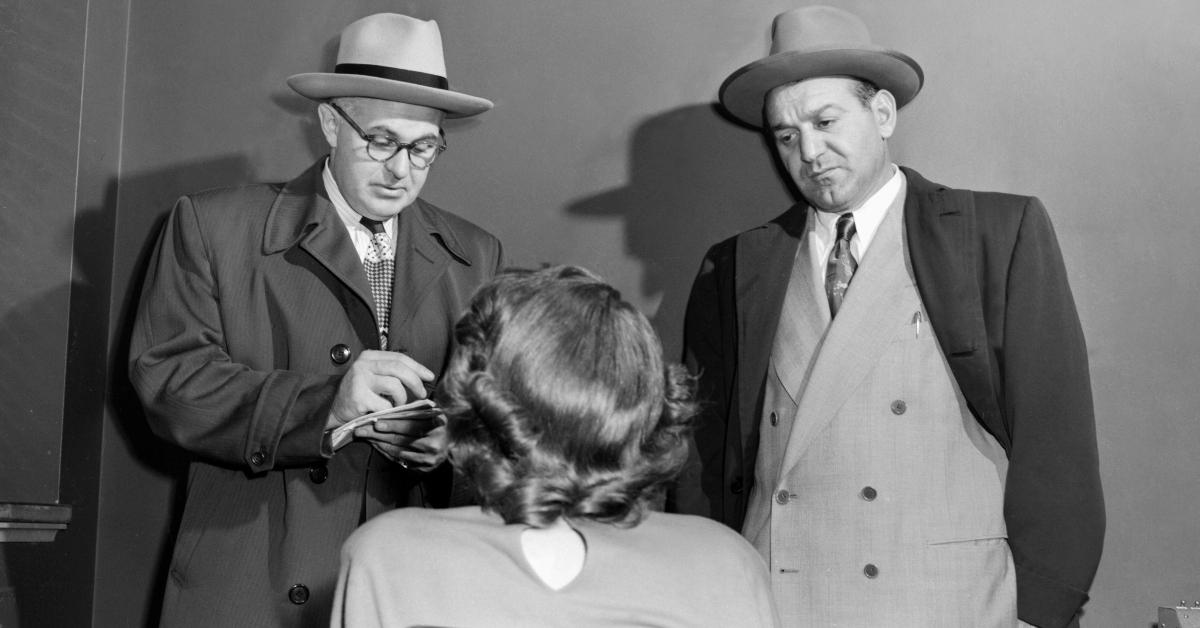Ad Blocker Detected
Our website is made possible by displaying online advertisements to our visitors. Please consider supporting us by disabling your ad blocker.

Reenactment of two men interview a female suspect or witness in a set up picture of a police interview
Anyone who consumes true-crime content has undoubtedly come across a podcast or documentary wherein a suspect has provided a false confession. You might think to yourself, “I would never do that.”
According to Alan Hirsch, Chair of the Justice and Law Studies Program at Williams College and a leading false confessions expert and trial consultant, it’s more common than people think.
Article continues below advertisement
He is also host of The Truth About False Confessions podcast where he “explores the tragic phenomenon and immense ramifications of false confessions through the lens of riveting cases.”
Distractify was able to chat with Alan about this oft-confusing phenomenon and while the frequency of occurrence may seem bleak, he assures us there is hope. Here’s what happens when someone falsely confesses.
Article continues below advertisement
When someone falsely confesses, it’s nearly impossible to reverse course.
Once the false confession wheels have been put into motion, it’s extremely difficult to extricate one’s self from this situation. The last stop will undoubtedly be prison.
“Even if their innocence is later established,” explained Alan, “it can be excruciatingly difficult to gain their release.” Once it’s established that a false confession was obtained, it stands to reason that the members of law enforcement involved will be held responsible for their actions. Alas, Alan has yet to hear of such a thing.
According to Alan, nothing happens to the officers who elicit a false confession unless they broke the law while doing so. If you’re like us, that makes your blood boil. As tempting as it is to blame the officers involved, sadly they are generally working within the confines of the law.
Technically they aren’t doing anything wrong. “The scandal is what’s legal,” said Alan. “For example, the courts have basically said that lying to a suspect is fine.” So, how can we tell if we’re about to get tricked?
Article continues below advertisement
What are some police tactics used to obtain a false confession?
There are two tactics police will trot out while trying to obtain a false confession. The first is telling the suspect they are 100 percent sure they’re guilty and not only that, they have proof. The more the suspect denies the allegations, the harder the officer questioning them will double down on the knowledge of their guilt.
Article continues below advertisement
Next they will essentially switch from bad cop to good cop by “Introducing themes (such as accident, provocation, secondary role) that minimize the severity of the crime or the suspect’s culpability,” Alan told us. “This combination communicates to the suspect the futility of maintaining innocence while implying that confessing will avert serious punishment: You bring on despair but supply a lifeline.” This one-two punch effectively breaks down the guilty and innocent alike. No one is safe from it.
Anyone can be a victim of a false confession.
As a reminder, even the strongest of heart and mind can fall victim to these tactics.
“The frequency of false confessions is staggering, and they happen to people who are educated and intelligent as well as to others,” explained Alan. “They are produced by widespread interrogation tactics, which don’t involve shining bright lights at a suspect or slamming desks, much less physical abuse.”
Keep your head on a swivel, and always ask for a lawyer.
Article continues below advertisement
To curb the prevalence of false confessions, Alan said the most valuable tool available today is a videotaped interrogation. Thankfully they are now required in most jurisdictions, but have also been less helpful than one might assume.
“Juries may see how the police pressured someone into confessing, but they also see the person say ‘I did it’ and people have trouble accepting that someone innocent would do that,” shared Alan.
The best thing that could happen is a full overhaul of interrogation tactics, starting with no longer allowing police to lie to suspects.
If you’re feeling exhausted and ready to give up, please don’t! A regular citizen can certainly affect change. Start by voting for people who want the same things you do! Also, “write letters to your state legislators urging them to introduce legislation requiring interrogations to be videotaped, if you’re in a state that doesn’t do that already,” suggested Alan.
Change is gradual, but not impossible.
Source: https://www.distractify.com/p/what-happens-when-someone-falsely-confesses